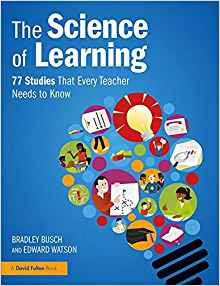I learnt more science from reading this book than I learnt in five years of secondary school.
Read MoreQuick look: The Meritocracy Trap
We like to believe that meritocracy is a good thing, in that it rewards effort, and acts as a great leveller. Is that actually the case?
Read MoreReview of Computing and Related Qualifications
Bob Harrison writes: “We have a computing curriculum and suite of qualifications which neither meet the needs of all pupils nor the needs of a rapidly evolving digital workplace and world.”
Read MoreReview of Dear Data
This book covers an immense range of the kinds of data that we ‘store’. The authors spent a year sending each other weekly, themed postcards. These contained not words, but pictorial representations of the data they had collected.
Read MoreReview: Trust me, I'm lying
In TMIL, Holiday demonstrates how easy it is to manipulate the news. A must-read for teachers of media or digital literacy.
Read MoreQuick look: Hello World
Hello World, by Hannah Fry, offers an interesting perspective on some of the problems besetting artificial intelligence algorithms.
Read MoreReading and research, by Terry Freedman
Book review round-up to 22 September 2019
Here is a set of links to the educational computing books I’ve reviewed up till 22 September 2019.
Read MoreReview of Practical Pedagogy
Are new technologies useful or merely a distraction? How do we give pupils the skills they need to navigate the world when they leave school when we’re not sure what that world will be like? What is the proper place for evidence-informed education and educational research?
Read MoreReview of The Science of Learning
This book aims to solve the difficulties teachers face in accessing educational research through the approach of presenting each research study as a double-page spread.
Read MoreQuick looks: Critical Media Literacy and Fake News in Post-Truth America
This is a very interesting, thought-provoking and readable book. I’ve only read 25% so far, but it’s looking good so far.
Read MoreA page from Cool Coding.
What I'm reading: Cool Coding
A few initial thoughts on a book about programming and how computers work.
Read MoreWhat I've been reading: Offline
Why do many people seem to be addicted to their smartphones? This book explains how we get drawn in to constantly checking for updates, and suggests what we might do about it.
Read MoreTerms and Conditions: The Graphic Novel
If only all terms and conditions were presented like this!
Read MoreComputing and Related Qualifications
Computing and related qualifications ebook: why?
Here’s a brief note about why I wrote this mini-guide, and a couple of screenshots from its pages.
Read MoreIf you’re looking for a course in computing or a related area, and you live in England, look no further! This ebook contains over 200 entries all in one place.
Computing and related qualifications: new e-directory
If you’re looking for a course in computing or a related area, and you live in England, look no further! This ebook contains over 200 entries all in one place.
Read MoreBook review: Excel 2019 Bible
I recently received this massive tome, the Excel 2019 Bible. Here’s what I thought of it.
Read MoreBook review: Access 2019 Bible
I recently received this hefty volume, the Access 2019 Bible. Here’s what I thought of it.
Read MoreBook review: How to think like a coder
This book aims to teach you how to think like a coder, rather then merely learning how to code. How far does it succeed?
Read MoreComputing books received, by Terry Freedman
Computing books received in March 2019
These books, which I received recently, look interesting, and I’m looking forward to reading and reviewing them. All book links are Amazon affiliate links.
How to think like a coder was shortlisted for an educational writers’ award, which you can read about here: The 2018 Educational Writers Award. I didn’t receive this in March, but have only now started to look at it in depth. I’ve already penned a few notes about it here: Books in Brief: How to think like a coder.
Monitored, which I’ve just started reading, is an examination of big data and surveillance from a Marxist perspective. I haven’t looked at any Marxist literature for a very long time — not since I tried to read Das Kapital when I was 17 (I got as far as page 23, which was 8 pages further than one of my teachers!) — so it’s a completely new perspective for me, which makes this an interesting, if difficult, read.
It covers similar ground to other books on the same subject matter that I have to review — indeed it references some of them — but with a clearly different take on the whole thing. I have to say that from the little I’ve read so far I remain unconvinced, and happily so.
Mission Python has been sent to me by Teach Secondary magazine. As the title suggests, it’s a book that teaches you how to program in Python. All I can say about it so far is that it looks colourful, and that I’m looking forward to reading it.
Half-price offer on my guide to getting the most out of conferences
UPDATED! For one week only, my guide to getting the most out of education conferences is available for half price.
Read More













